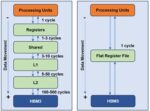As computing expands from data centers to edge devices, semiconductor designers face increasing pressure to optimize both performance and energy efficiency. Advanced process nodes continue to provide transistor-level improvements, but scaling alone cannot meet the demands of hyperscale AI infrastructure or ultra-low-power… Read More
Artificial Intelligence
An AI-Native Architecture That Eliminates GPU Inefficiencies
A recent analysis highlighted by MIT Technology Review puts the energy cost of generative AI into stark perspective. Generating a simple text response from Llama 3.1-405B—a model with 405 billion parameters, the adjustable “knobs” that enable prediction—requires on average 3,353 joules, nearly 1 watt-hour (Wh). Once cooling… Read More
An Agentic Formal Verifier. Innovation in Verification
In a break from our academic-centric picks, here we look at an agentic verification flow developed within a semiconductor company. Paul Cunningham (GM, Verification at Cadence), Raúl Camposano (Silicon Catalyst, entrepreneur, former Synopsys CTO and lecturer at Stanford, EE292A) and I continue our series on research ideas.… Read More
Agentic EDA Panel Review Suggests Promise and Near-Term Guidance
NetApp recently hosted a webinar on Agentic AI as the future for EDA and implications for infrastructure. Good list of panelists including Mahesh Turaga (VP Cadence Cloud) with an intro preso on infrastructure and agentic AI at Cadence, then our own Dan Nenni (Mr. SemiWiki) moderating, Khaled Heloue (Fellow AMD, CAD CAD/Methodology/AI),… Read More
Podcast EP332: How AI Really Works – the Perspectives of Linley Gwennap
Daniel is joined by Linley Gwennap, technology analyst and author of the new book “How AI Really Works: The Models, Chips, and Companies Powering a Revolution.” Linley was the long-time editor of Microprocessor Report and chaired the popular Linley Processor Conferences.
Dan explores what impact AI is having on the market and… Read More
Improving Retrieval Accuracy in AI
While there are big ambitions for virtual engineers and other self-guiding agentic applications, today estimates show 83-90% of AI inferences are for internet searches. On a related note, chatbots are now said to account for nearly 60% of internet traffic. Search and support are the biggest market drivers for automation and … Read More
Bronco Debug Stress Tested Measures Up
I wrote last year about a company called Bronco, offering an agentic approach to one of the hottest areas in verification – root-cause debug. I find Bronco especially interesting because their approach to agentic is different than most. Still based on LLMs of course but emphasizing playbooks of DV wisdom for knowledge capture … Read More
TSMC and Cadence Strengthen Partnership to Enable Next-Generation AI and HPC Silicon
TSMC continues to reinforce its leadership in advanced semiconductor manufacturing through its deepening collaboration with Cadence Design Systems. The expanded partnership focuses on enabling next-generation artificial intelligence and high-performance computing innovations by aligning advanced electronic design… Read More
How Memory Technology Is Powering the Next Era of Compute
For more than a decade, progress in artificial intelligence has been framed almost entirely through the lens of compute. Faster GPUs, denser accelerators, and higher TOPS defined each new generation. But as generative and agentic AI enter their next phase, that framing is no longer sufficient. The most advanced AI systems today… Read More
Watch Live Agentic Software Debug
Many moons ago in the Innovation series we explored techniques like spectrum analysis to root-cause bugs. While these methods provide some value they don’t get as close as we would like to isolating a root-cause. In hindsight given what we know about the complexity of conventional debug it is unsurprising that we can’t root-cause… Read More











A Detailed History of Samsung Semiconductor